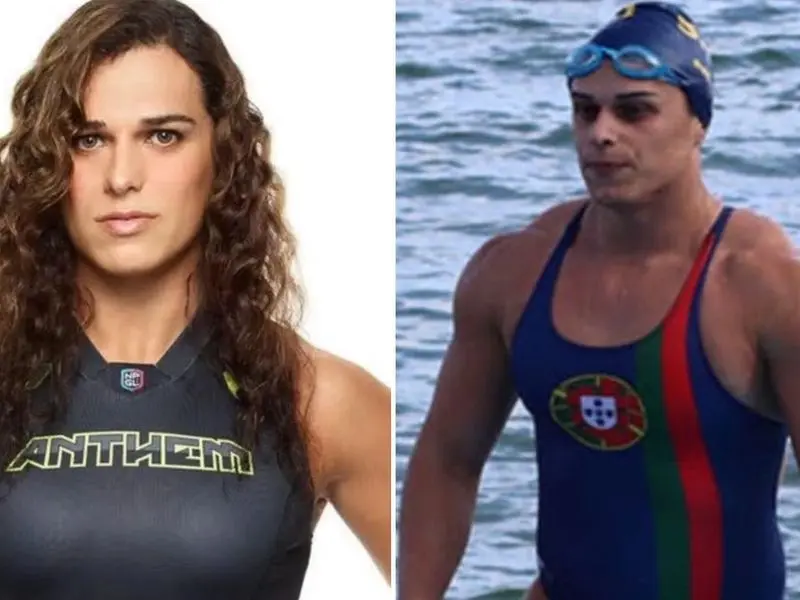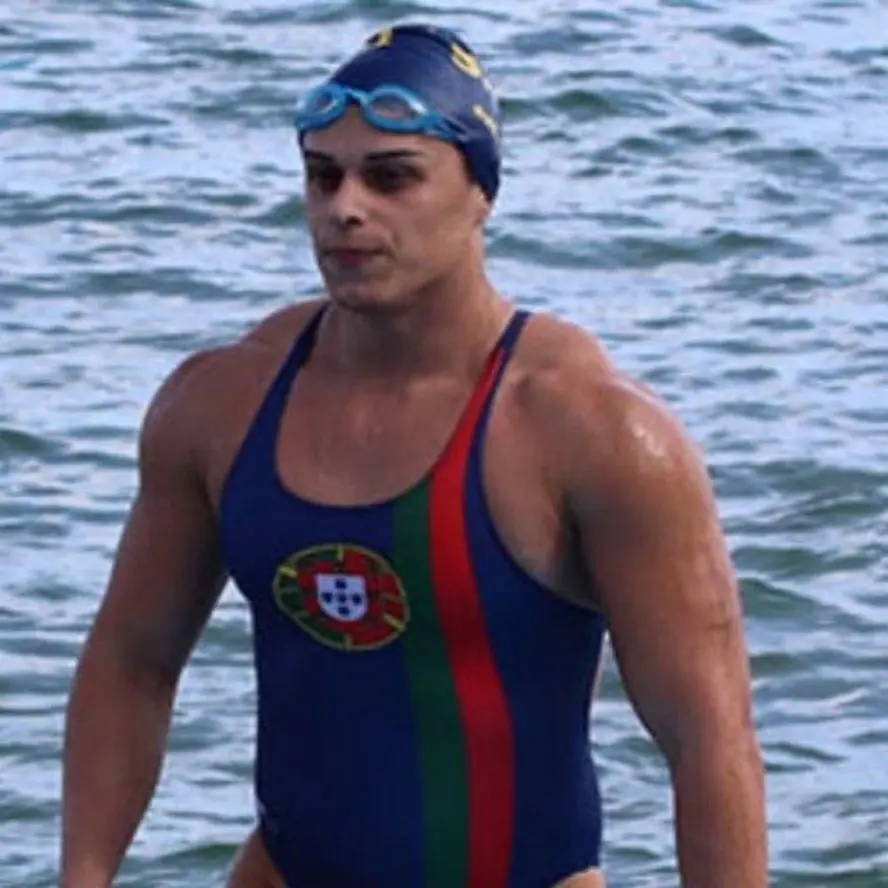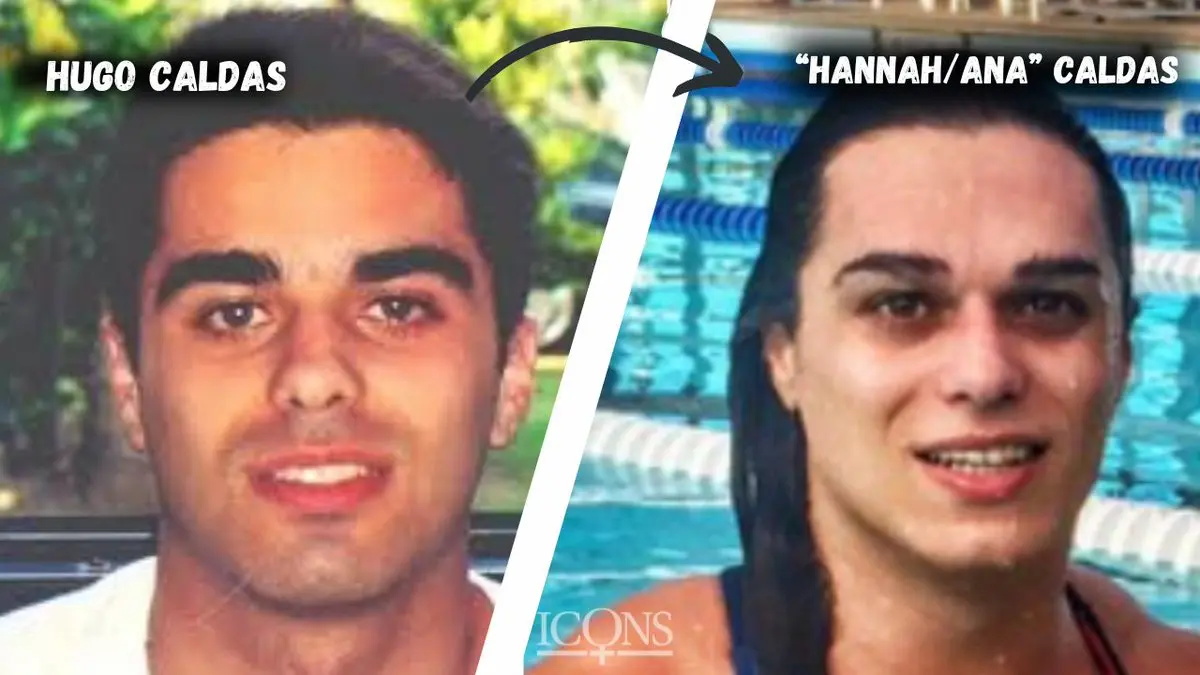In the world of competitive swimming, few stories capture the raw intersection of personal identity, athletic passion, and policy controversy like that of Hannah Caldas.

The 48-year-old American Masters swimmer, a veteran of over three decades in the pool, has been thrust into the spotlight not for a record-breaking lap, but for a profound refusal.
Banned for five years by World Aquatics until October 2030, Caldas has had all her medals and results from June 2022 to October 2024 stripped away. Her crime? Declining a mandatory gender-verification test deemed invasive and unnecessary.
This decision came after an investigation triggered by her dominant performances in women’s events, including multiple wins at the 2025 U.S. Masters Swimming Spring Nationals. Caldas, born in Portugal and now representing the U.S., had built a legacy as a fierce competitor, also excelling in CrossFit and even equaling the women’s 500m indoor rowing world record in 2021. Yet, her journey took a painful turn when World Aquatics enforced its eligibility policy, requiring chromosomal testing to confirm compliance with the women’s category rules.
The ban’s announcement on October 18, 2025, sent ripples through the aquatics community. Caldas, who competed under the name Ana earlier in her career and swam in men’s categories from 2002 to 2004 before transitioning, viewed the test as a violation of her privacy. “Chromosomal tests are invasive and expensive procedures,” she stated through a New York Aquatics press release. “My insurance refuses to cover such a test because it is not medically necessary.” No U.S. state mandates genetic testing for recreational adult sports, she noted, nor does U.S. Masters Swimming (USMS), which had cleared her eligibility in August 2025 based on her birth certificate, passport, and self-identification as female.
For Caldas, the pool was more than a sport—it was a sanctuary. Growing up in Portugal, she discovered swimming as a child, channeling energy into strokes that carried her across oceans of challenge. Relocating to the U.S., she dove into Masters competitions, where age-group athletes chase personal bests and camaraderie.

Her victories weren’t just times on the clock; they were affirmations of resilience. In 2024, at the World Aquatics Masters Championships in Doha, she claimed gold in several events, her form slicing through water like a testament to years of discipline. Friends recall her as the teammate who lingered for encouragement, her laugh echoing off tiled walls.
But success bred scrutiny. Earlier in 2025, Texas Attorney General Ken Paxton launched an investigation into USMS after Caldas’s wins at the Spring Nationals in San Antonio, a state with strict laws barring transgender athletes from women’s sports. Paxton decried the policies as “insane,” accusing the organization of yielding to “radical activists.” Though USMS upheld her eligibility, citing documents proving her female assignment at birth, World Aquatics stepped in with broader authority.
Their policy, updated post-2022 to exclude those who transitioned after male puberty, demanded proof via genetic testing—at Caldas’s expense. Refusal equaled ineligibility, a rule echoing cases like Lia Thomas, the transgender swimmer banned by World Aquatics in 2022 after NCAA triumphs.
The emotional toll hit hard. Caldas’s statement, released shortly after the ban, laid bare her anguish. “I’M REALLY HURT BY THIS BAN,” she wrote in a post shared across social media platforms, her words a raw plea amid the policy storm. The ellipsis trailed like an unfinished lap: “It feels like everything I’ve built is being erased, not because of what I did in the water, but because of who I am.” She described nights staring at faded ribbons, once symbols of joy, now hollow reminders of exclusion.
The five-year suspension doesn’t just pause her career; it coincides with her prime Masters years, potentially costing her a shot at future worlds or nationals. “I’ve poured my soul into this sport,” she continued, “and now it’s demanding a piece of my body I won’t surrender.”
Her post went viral, amassing thousands of shares and sparking debates from poolside chats to global forums. Supporters flooded comments with hearts and stories of solidarity, praising her as a defender of privacy rights. “This isn’t about fairness in sport—it’s about control over women’s bodies,” one fan wrote.

Critics, however, saw it as dodging accountability, arguing her past male-category swims and physical advantages warranted verification. “Records don’t lie, but neither does biology,” tweeted a conservative commentator, echoing Paxton’s rhetoric. On X (formerly Twitter), threads dissected her times: Caldas’s 100m freestyle splits often outpaced female peers by margins reminiscent of Thomas’s controversies. Yet, Caldas countered that Masters swimming is recreational, not elite, where joy trumps jeopardy.
The ban’s timing amplifies the hurt, landing just weeks before a seismic shift from the International Olympic Committee (IOC). On November 10, 2025, reports emerged that the IOC is barreling toward a blanket ban on transgender women in female Olympic events, effective potentially by January 2026. New president Kirsty Coventry, a seven-time Olympic swimming medalist elected in March, commissioned a review showing enduring male-born advantages—even post-hormone therapy—in strength, speed, and endurance. Dr. Jane Thornton’s presentation to IOC members highlighted cheek-swab SRY gene tests used by World Athletics, framing them as “factual and dispassionate.” This aligns with Coventry’s pledge: “Protecting the female category is paramount.”
For Caldas, whose dreams once flickered toward Olympic-adjacent Masters showcases, this IOC pivot feels like a final door slamming shut. Though not an Olympian, she eyed international berths through World Aquatics pathways. Now, with the ban stripping her of sanctioned events, her competitive horizon darkens.
The IOC’s move, influenced by U.S. President Donald Trump’s February executive order barring transgender women from American women’s sports—and threatening LA 2028 visas—signals a global tide turning conservative. Sports like athletics and cycling already exclude post-puberty transitions; swimming’s policy, under which Caldas fell, mirrors this. An “open” category exists for inclusivity, but Caldas dismissed it as segregating, not equalizing. “Why create a lane for us when the main pool should welcome all?” she asked in her post.
Caldas’s story isn’t isolated; it’s a microcosm of broader battles. Laurel Hubbard’s 2021 Tokyo appearance as the first openly transgender Olympian ended medal-less but ignited fury. Imane Khelif’s 2024 Paris boxing gold, amid gender eligibility disputes, fueled calls for uniformity.

The IOC’s framework since 2021 deferred to federations, but Coventry’s leadership demands cohesion. Critics warn of overreach: a 2024 IOC-backed study suggested transgender women might face disadvantages in aerobic capacity. Yet, the prevailing evidence sways toward restrictions, potentially affecting differences of sexual development (DSD) athletes like Caster Semenya, barred since 2019. For Caldas, it underscores a painful irony—her refusal protected privacy, but the encroaching bans erode inclusion entirely.
As she processes the loss, Caldas channels hurt into resolve. “If a five-year suspension is the price to protect my most intimate medical information, then it’s a price I’m happy to pay—for myself and every woman who doesn’t want invasive testing just to compete,” she declared. She’s retiring from sanctioned swimming, vowing to coach young athletes in unsanctioned meets, emphasizing technique over tribunals. Her post ends on a defiant note: “…but I won’t stop swimming. The water doesn’t judge; it just holds you up.” Friends rally with open-water swims, turning exclusion into community.
The aquatics world watches, divided yet reflective. World Aquatics defends the policy as safeguarding fairness, noting no appeals process for refusals. USMS, post-investigation, maintains recreational leniency but faces pressure to align. Caldas’s case, the first major Masters-level enforcement, tests boundaries: Is verification a shield or a sword? Her erased medals—hard-won in events like the 200m butterfly—symbolize more than hardware; they’re chapters of a life reclaimed through sport.
In this evolving landscape, Caldas emerges not as victim, but vanguard. Her ban, timed with the IOC’s rumored overhaul, ends any Olympic whisper for transgender athletes like her. Yet, in sharing her heartbreak, she amplifies voices long silenced. As November 2025 unfolds, with IOC sessions looming in Milan, the debate surges. Will policies prioritize biology over identity, or find a fluid middle? Caldas’s words linger: hurt, yes, but unbroken. Swimming, after all, is about strokes forward, even against the current.
